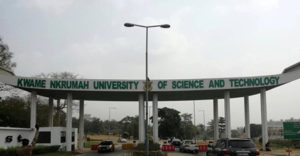KNUST leads project for responsible use of Artificial Intelligence
 A scientific project designed to strengthen capacities in the responsible utilisation of artificial intelligence (AI) has started at the Kwame Nkrumah University of Science and Technology (KNUST).
A scientific project designed to strengthen capacities in the responsible utilisation of artificial intelligence (AI) has started at the Kwame Nkrumah University of Science and Technology (KNUST).
Dubbed: “Responsible Artificial Intelligence Lab (RAIL),” the project is being hosted by the University to support the most vulnerable communities in Ghana, Senegal, Cape Verde, and the Gambia among others in the Sub-region.
It is meant to develop and apply responsible AI tools for the advancement of computer, social, biomedical, agricultural and ecological sciences, innovation and technology and the socio-ethical application of inventions.
Professor Mrs Rita Akosua Dickson, the Vice-Chancellor of the KNUST, addressing an inception workshop on the RAIL project, said the novelty would help provide a sustainable approach to nurturing local talents to engage in multidisciplinary and responsible AI for development research.
The key sponsors include the Deutsche Gesellschaft fur Internationale Zusammenarbeit (GIZ), International Development Research Centre -Canada, and SIDA, a development organisation.
“RAIL is one of the several technology-driven scientific projects that researchers from the KNUST are leading,” the Vice-Chancellor said, explaining that the agenda was to realise the Sustainable Development Goal (SDG) 17 Target 6.
The Goal prioritises knowledge sharing and cooperation for access to science, technology and innovation.
In the case of Ghana, the KNUST, through the RAIL project, would be working with its partners at the Université Alioune Diop de Bambey, Senegal, University of Cape Verde, and the Gambia Technical Training Institute to advance the vision of the initiative, Prof Dickson said.
The stakeholders would share knowledge to prepare the country and the sub-region to make a significant contribution towards the projected 42.2 per cent growth in global AI market share from 2020 to 2027.
At the heart of this project “is inclusion, diversity, gender mainstreaming, innovation and responsible use of technology and socio-ethical application of inventions,” she said.
Prof Mark Adom-Asamoah, the Provost of the College of Engineering, KNUST, said the College, by dint of hard work, had become the driver of innovative solutions to advance national development.
“At a time when the use of AI had become contentious, with the prospects of its use looking unpredictable, what remains significant is the need to prepare scientists to be ethical and responsible with their use and application of AI.”
Prof. Jerry John Kponyo, the Principal Investigator and Scientific Director of RAIL, said the Fourth Industrial Revolution was an AI-powered revolution requiring the use of digital technologies to drive key aspects of the economy.
“Africa, and for that matter the sub-Region, must strategically position itself to lead the revolution,” he stated.
Source: GNA
